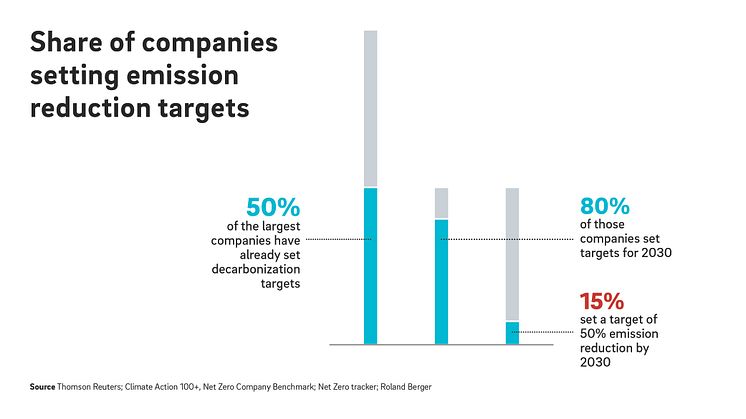
Press release -
Study: How companies can speed up their CO2 emission reductions
- The reduction targets of the world's largest corporations cut emissions by only 20 percent by 2030
- Many companies can see the competitive advantages presented by decarbonization
- Six action areas to speed up emission reduction plans
Munich, September 2022: The targets set by the 4,700 largest listed companies in the world will reduce CO2 emissions by just 20 percent by 2030. Yet meeting the Paris Agreement goal of limiting global warming to 1.5°C requires a 43 percent reduction. The main barriers to more effective climate action include the limited availability of green energy and the massive investments required. These are among the findings of the study “Accelerating decarbonization. Six action areas for speeding up your emission reduction plans” by Roland Berger. The experts offer solutions for companies to accelerate decarbonization and thus also gain a competitive advantage.
"Many businesses have started out on their climate action journey, but clear effects are still rarely visible," says Yvonne Ruf, Partner at Roland Berger. "What they do in the next five years will be crucial for both, the planet and their own competitiveness. It is time for companies to take decarbonization to the next level."
The study found that the majority of corporates has made plans to reduce emissions by 20 percent by 2030. Only 15 percent of large companies aim to halve their greenhouse gas emissions by 2030.
What is currently hampering more effective action on climate change
The study's authors identified several reasons behind the slow progress. One is that the availability of green energy is very limited in most countries. The cost of generating green electricity has come down, but there is still a pressing need for the installed capacity to be ramped up. Green molecules remain more expensive in most cases, although green hydrogen is now able to achieve payback as a result of the high gas prices. Some of the clean technologies that will be needed for more effective action on climate change are not yet commercially available. More than one-third of CO2 emission reductions by 2070 will come from technologies that are currently still in the prototype (18%) or demonstration phase (18%). To help them reach maturity, global investments in clean tech and infrastructure will need to total almost USD 2 trillion a year in the 2020s, further increasing to almost USD 3 trillion in the 2030s. That adds up to a cumulative total of USD 56 trillion by 2050.
CO2 emissions as a new currency
Greater pressure from regulators (such as the EU Commission, but also in the United States) and the continuous rise in the price of CO2 is compelling companies to act. The study's authors predict that today's CO2 price of less than USD 100 per ton of CO2 equivalent will rise to as much as USD 200/t CO2. This will have a great impact on companies and their supply chains.
"Companies' competitiveness was mostly based on cost and quality in the past," says Ruf. "Now there is another dimension to it: CO2. This is turning carbon emissions into a currency that needs to be managed systematically – given the direct impact on the corporate bottom line."
Solutions for speeding up emission reduction plans
The authors describe six key areas where companies need to take action to accelerate decarbonization in the next five years. This is a critical time frame, as the global carbon budget could be used up in the next four to eight years. Future corporate competitiveness depends on making the necessary investments now, piloting technologies and bringing first green products to market to be able to serve the growing demand for low-emission products and services.
To this end, businesses should reduce their energy consumption and generate their own clean energy or switch to emission-free electricity. Where necessary, private investments in clean tech should be supported by public funding until such technologies reach the point of maturity. To minimize supply chain emissions, companies must engage with critical suppliers in a targeted manner. Corporates should limit their products' carbon footprints by rethinking their design and material mix or leveraging circularity. And finally, digital tools and artificial intelligence can help identify sources of emissions and create transparency over each company's progress towards achieving its climate targets.
Topics
Categories
Roland Berger is the only strategy consultancy of European origin with a strong international presence. As an independent firm owned exclusively by our partners, we have 51 offices with a presence in all major markets. Our 2,700 employees are characterized by a unique combination of analytical thinking and an empathetic mindset. Driven by our values of entrepreneurial spirit, excellence, and empathy, we are convinced that business and society need a new, sustainable paradigm that focuses on the whole value-creation cycle. By working in interdisciplinary teams across all relevant sectors and business functions, Roland Berger offers the best expertise worldwide for successfully overcoming the profound challenges of our age now and in the future.




